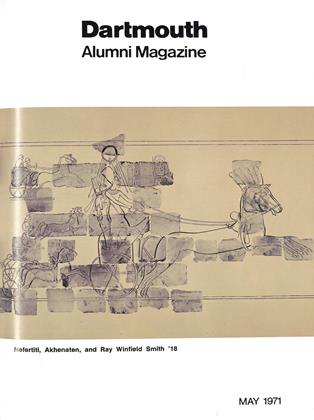In its first formal expression of opinion on the issue, the Faculty of Arts and Sciences at Dartmouth College last month approved a resolution endorsing the admission of women as candidates for the Dartmouth baccalaureate degree by September 1972.
The resolution, which includes broad guidelines for implementation if coeducation is approved for Dartmouth, was presented to the Trustees when they met in Hanover for three days, April 15-17, for their annual spring session. Only two items were on the Trustees' agenda—coeducation and long-range financial planning.
In addition, the Board of Trustees, which must make the final decision on the issue, was scheduled to receive a report from its own study committee also recommending adoption of coeducation. That committee, which has been considering the question of coeducation for nearly two years, is comprised of Trustees, faculty, administrative officers, undergraduates, and alumni.
With only about half the Faculty of Arts and Sciences attending the April 12 meeting, the vote was 111 to 18 in favor of the coeducation resolution, with five abstentions.
The resolution worked out earlier by the executive committee of the faculty, was described as broad enough in concept to encompass any of the four detailed plans for changes in the academic calendar and enrollment totals proposed to date as vehicles for introducing coeducation, should that be adopted. The vote came after the faculty heard a report describing proposed federal legislation now being considered in Congress to expand the Civil Rights Act of 1964 to prohibit discrimination against sex, as well as race, creed or color by institutions of higher education receiving any federal support.
As guidelines indicating the directions in which the Faculty of Arts and Sciences wished Dartmouth to go if coeducation is approved, the faculty recommended:
(1) "that the undergraduate student body of the College should be increased substantially; (2) that, to accommodate this increased student body without recourse to significant expansion of existing plant, the summer term at Dartmouth College should be made academically equivalent to the three other terms; and (3) that the faculty of arts and sciences should adopt such procedures, including the possibility of mandatory off-campus and/or summer terms, as may be necessary to insure that roughly 3000 undergraduates are on campus during each of the fall, winter, and spring terms."
It was further voted as the sense of the meeting that the Faculty of Arts and Sciences would have an opportunity to review and approve any detailed plan emerging from those guidelines for later recommendation to the Trustees.
Although earlier polls had shown that approximately 90 per cent of the faculty favored some form of coeducation at Dartmouth, the vote last month was the first occasion when the College's teaching corps had been asked not only to take a formal stand on the issue but to indicate the limits of changes or sacrifices it would approve to make coeducation possible.
By endorsing in the guidelines a strategy of increasing the student body substantially by making the summer session academically equivalent to the three other terms and encouraging offcampus term projects, the faculty appeared to have recognized, by implication, the arguments against expanding Dartmouth's physical plant to accommodate women .students on the one hand and, on the other hand, against decreasing markedly the present male population at the College.
 View Full Issue
View Full Issue
More From This Issue
-
 Feature
FeatureNefertiti, Akhenaten, and Ray Winfield Smith '18
May 1971 By John R. Scotford Jr. '38 -
 Feature
FeatureThe Dartmouth Institute
May 1971 -
 Feature
FeatureTrustees Vote to Consider Associated School for Women
May 1971 -
 Article
ArticleThe Undergraduate Chair
May 1971 By JOEL ZYLBERBERG '72 -
 Article
ArticleFaculty
May 1971 By WILLIAM R. MEYER -
 Article
ArticleHanover's Famous May "Murder"
May 1971
Article
-
 Article
ArticleIMPORTANT POSITION FOR '94 MAN
January 1918 -
 Article
ArticleREUNION SPIRIT LIKENED TO CHRISTMAS SPIRIT
May 1925 -
 Article
ArticleTeaches Russian Life
October 1942 -
 Article
ArticleA '67 RECORD
MARCH 1964 -
 Article
ArticleEXPERIMENTAL THEATRE'S SIXTEENTH SEASON
January 1942 By R. R. Rordgers '42 -
 Article
ArticleBergen County
OCTOBER 1970 By TYLER W. DANN ’52

